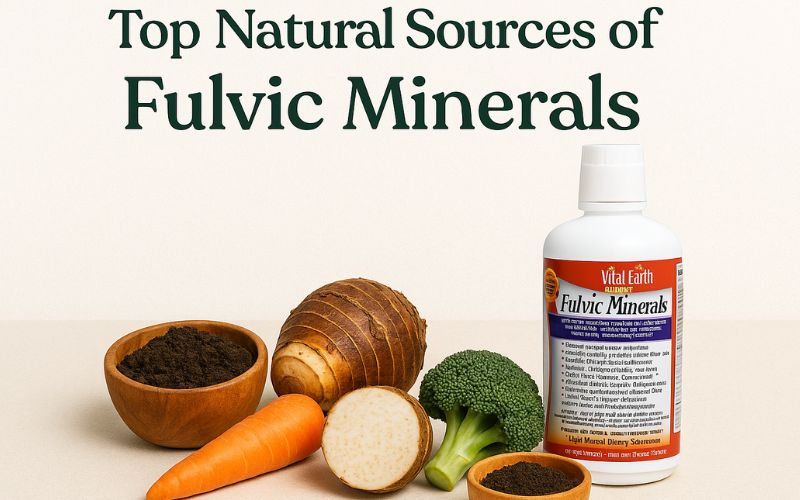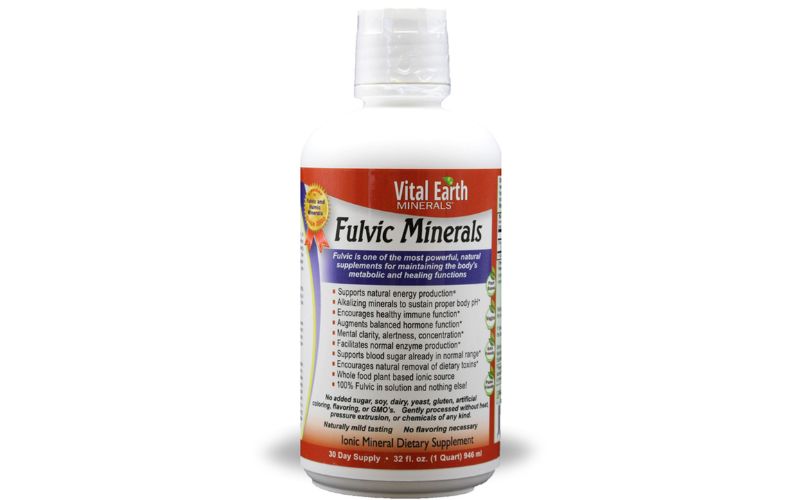Top Natural Sources of Fulvic Minerals
18th Jun 2025
Minerals are essential for almost every process in the human body. This is why they are gaining significant attention in the natural health field. Of them all, fulvic minerals are unique, not because they're popular, but because they provide unparalleled bioavailability and advantages.
These mighty minerals are derived from the earth itself and bring with them thousands of years of plant intelligence. But what are fulvic minerals, where do they originally derive from, and why should you be concerned? Let's explore what fulvic minerals are and how they are created.
What Are Fulvic Minerals?
Fulvic minerals are natural molecules that are created when plant material dissolves over centuries. They belong to a family of substances known as humic substances, which consist of fulvic acid, humic acid, and humin. Fulvic minerals contain trace minerals such as zinc, copper, iron, magnesium, and even unique minerals you may not derive from your usual meals.
What makes fulvic minerals unique is that they're so small in terms of molecular size and electric charge that they can bind to nutrients and transport them into your cells. They're the delivery system of nature: small yet powerful, targeted deliveries.
How Fulvic Minerals Are Formed
These minerals are naturally produced through the breakdown of organic matter in soil over time. Microbes that digest organic matter produce fulvic acid as a byproduct. Plants gather minerals and trace elements from the surrounding soil and convert them into forms they can utilize. Soil bacteria help by breaking apart the bonds in mineral rocks and natural materials. This process creates fulvic ionic minerals and other essential nutrients that are readily available for plants and ultimately for humans.
This entire process occurs only in rich, unpolluted soil conditions—something that's increasingly becoming a rarity due to contemporary agricultural methods. This is why fulvic minerals are increasingly derived and concentrated from certain areas where nature has remained unbroken.
Why Are Fulvic Minerals Important?
Fulvic minerals matter since they serve as natural carriers that enable your body to absorb and utilize important nutrients better. They also aid in cell well-being by bringing minerals into cells while flushing out toxins, keeping your body balanced and energized.
1. Bioavailability and Nutrient Transport
Fulvic minerals work as a bridge, joining the nutrients found in food or supplements to the cells of your body. Because they are tiny and negatively charged, they can travel through cell membranes and carry along the nutrients with them. This renders the vitamins and minerals that you intake much more beneficial.
2. Cellular Health
Each cell within your body depends on a constant supply of nutrients to operate, and fulvic minerals ensure this flow occurs without interruption. They also serve to detoxify cells by stripping away heavy metals and other toxins. This dual purpose—delivering the good and eliminating the bad—is what makes fulvic minerals such a vital component of long-term health.
Natural Sources of Fulvic Minerals
Although fulvic acid itself is mostly seen in soil and natural decay, certain whole foods naturally take up fulvic minerals in the process of growth. These are not only rich in nutrition but are also indirect sources of fulvic acid when produced in mineral-rich conditions. Adding these to your diet can be a simple and natural way to increase your intake of fulvic acid.
1. Shilajit
Shilajit is a strong, tar-like substance extracted from the rocks of high mountain ranges, most commonly the Himalayas. It has been developed over centuries through the decomposition of plant life and contains a significant amount of fulvic acid. It consists of more than 80 minerals and trace elements, such as iron, calcium, magnesium, and zinc. Shilajit is traditionally used in Ayurvedic medicine to boost energy, enhance stamina, and promote overall vitality.
Usage Tip: Mix a small pea-sized quantity of shilajit resin in warm milk or water and take it once daily, preferably on an empty stomach.
2. Root Vegetables
Root vegetables possess long root systems that enable them to extract a broad spectrum of minerals from the soil, including fulvic minerals. Some of the more prominent root vegetables containing fulvic acid are:
- Beets: Bland in nitrates and antioxidants, beets help maintain healthy hearts and circulatory blood.
- Carrots: Having high contents of beta-carotene and fiber, carrots ensure healthy eyes and digestive systems.
- Sweet Potatoes: Full of vitamins A and C, they enhance immune system function and skin health.
- Turnips and Parsnips: They contain high dietary fiber and essential nutrients.
Incorporation Tip: Roast, steam, or add these root vegetables to soups and stews to reap the benefits of their fulvic mineral content.
3. Sea Vegetables
Sea vegetables, including kelp, nori, dulse, and wakame, are seaweed plants that take minerals directly from seawater. They contain iodine, calcium, magnesium, and other trace minerals and are great sources of fulvic minerals. Sea vegetables also have detox and thyroid-support functions.
Consumption Tip: Sprinkle seaweed on salads, soups, or smoothies, or snack on roasted seaweed as a quick alternative.
4. Fermented Foods
Fermentation is a natural process that increases the mineral content of foods. While fermenting, good bacteria ferment compounds, increasing the bioavailability of minerals. Sauerkraut, kimchi, and miso are not only high in probiotics but also in fulvic minerals. Cabbage in sauerkraut absorbs minerals from the ground, and fermentation boosts its nutritional value.
Serving Suggestion: Add a teaspoon of fermented foods to your meals to nourish gut health and mineral absorption.
5. Blackstrap Molasses
Blackstrap molasses is a residue of sugarcane production and has high mineral content. It has a high level of iron, calcium, magnesium, and potassium. The extensive root system of the sugarcane plant provides it with the ability to obtain minerals from deep in the earth, which is what gives molasses such a high mineral content.
Tip for Use: Add blackstrap molasses to baked goods as a natural sweetener, or stir in a spoonful into hot drinks for a mineral-packed kick.
6. Leafy Greens
Leafy greens, such as spinach, kale, arugula, and Swiss chard, are rich in fulvic minerals. They contain antioxidants, vitamins, and minerals that contribute to overall well-being. The dark green color of leafy greens reflects the high presence of chlorophyll, which is crucial for mineral uptake from the soil.
Incorporation Tip: Include leafy greens in salads, smoothies, or lightly cooked as a vegetable dish to reap their full nutritional rewards.
7. Nuts and Seeds
Nuts and seeds, including almonds, walnuts, flaxseeds, and chia seeds, not only provide healthy fat and protein but also include fulvic minerals. These aid in cardiovascular health, enhance nutrient absorption, and contribute to sustained energy.
Serving Idea: Mix a handful of nuts and seeds into your breakfast cereal or yogurt, or enjoy them as a snack.
8. Sprouts
Sprouts like alfalfa, mung bean, and broccoli sprouts are rich in nutrients, including fulvic minerals. They contain plenty of enzymes to support digestion and immune function. Sprouts are easy to cultivate at home and can be incorporated into a variety of foods.
Consumption Tip: Sprinkle fresh sprouts on a sandwich, wrap, or salad for a crunchy and healthy addition.
Conclusion
Fulvic minerals are important for nutrition, even though many people don’t know about them. They are derived from prehistoric plant material and contain key trace minerals needed by your body. Whether sourced from mineral-dense soil, mountain Shilajit, greens, or seaweed, fulvic minerals are essential for maintaining your energy levels, balance, and resilience.
Frequently Asked Questions
What are the main health benefits of fulvic minerals?
Fulvic minerals promote improved nutrient uptake, detoxify, exhibit antioxidant activity, and strengthen the immune system.
Can I obtain sufficient fulvic minerals from my diet?
Although an adequate diet containing full amounts of fulvic mineral sources can deliver plenty, some will find that supplements are necessary, particularly if dietary levels fall short.






